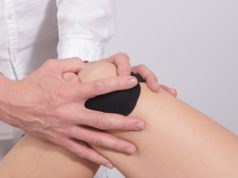Not having to deal with the discomfort of a monthly period is quite relieving, however, exchanging it for hot flashes, weight gain, vaginal dryness, night sweats, mood swings, insomnia, dry skin, and low sex drive is no fun. These are just a few of the many symptoms which occur primarily due to hormonal fluctuations which may begin as many as ten to fifteen years before you actually reach menopause.
Dealing with the emotional side of menopause might not be an easy process either. Estrogen is the hormone that manages almost all of a woman’s reproductive functions. As you approach menopause, your ovaries slow down their production of estrogen, which controls how much serotonin is being produced in your brain. Serotonin is a chemical which helps regulate your moods. If you’re producing less estrogen, you’re also producing less serotonin which makes this situation a bit more acceptable (understandable). This can have a direct impact on how optimistic you feel.
Fortunately, there are many natural supplements available online to help alleviate these symptoms. Find out more about Authority Reports, a great online resource filled with reviews which can help guide you when looking for a reputable manufacturer.
Perimenopause
Some women begin to notice symptoms of perimenopause in their late 30s or early 40s. These symptoms are associated with fluctuating levels of estrogen and progesterone, as well as changes to how often you ovulate. Symptoms tend to increase in frequency as you get closer to menopause.
Menopause
If you have not had a period for 12 months, you are considered to have reached menopause, which occurs most frequently between the ages of 45 and 55. Women who have had hysterectomies and are not on hormone replacement therapy may suddenly enter menopause post-surgically. They may experience more drastic symptoms due to sudden changes in hormonal levels. Women are more likely to develop osteoporosis and loss of bone density due to the significant decrease in estrogen occurring after menopause.
Common Symptoms Include:
- Menstrual irregularities – You may experience between period spotting or skip periods altogether, or your periods may begin to last longer than normal.
- Irregular ovulation – Ovulation will now occur at much less regular intervals.
- Irritability – Moodiness and depression may occur due to hormonal fluctuations.
- Changed libido – This may occur because of hormonal fluctuations and vaginal dryness, which can cause discomfort during intercourse.
- Hot flashes – This may occur as night sweats when you wake up with your sheets soaked with perspiration. The hot flashes may become more frequent as you draw nearer to menopause and may be very uncomfortable.
- Insomnia – Maybe an independent symptom or occur due to night sweats and hot flashes.
The Best Natural Ways To Deal With Menopause
Irritability And Moodiness
One of the best remedies for moodiness and irritability is exercise. Get outside and take a brisk 20-minute walk, start cycling or join a gym. Eat a healthy plant-based diet and make sure you are getting plenty of sleep.
Libido Changes
Spend time with your partner just enjoying one another’s company as often as possible.
Become active in stress reduction activities like exercise, walking or running.
Hot Flashes
Avoid caffeine and smoking at all costs as these can increase the body temperature and can worsen hot flash episodes. Eliminate any unnecessary medications provided a doctor has given you clearance to do so. Keep the areas in your house cool by either turning down the thermostat or turning on the air conditioner. A cooling pad also works wonders during this time. Wear light, natural fabrics and make sure you dress in layers so that you can take them off quickly if you find yourself experiencing a hot flash. Always keep water on hand for hydration.
Insomnia
As hot flashes or night sweats are the main cause of insomnia during menopause, make sure that the room environment is cool and calm. Sleep under natural fabric blankets and cotton sheets. Do not eat right before bedtime. A good time to eat dinner is two to three hours before you go to sleep. Avoid stimulants like caffeine or smoking, instead, opt for a soothing cup of herbal tea such as chamomile.
Vaginal Dryness
Adding omega-3 fats to your diet is one of the most natural ways to lubricate naturally. Coconut oil also serves as the perfect personal lubricant. If you are experiencing vaginal dryness it is also important to avoid dehydrating beverages such as alcohol and caffeine as this may worsen the problem. The easiest solution for vaginal dryness is to boost water intake and to eliminate soaps and powders that contain drying chemicals such as alcohol.
Hormone Replacement Therapy (HRT)
Hormone Replacement Therapy (HRT) is an available option to a woman going through menopause and especially those who have had a hysterectomy. The options should be discussed in detail with your health care provider as there are both benefits and disadvantages to taking Hormone Replacement Therapy (HRT).
Benefits associated with HRT include:
- A smaller possibility of heart disease
- Decreased risk of colorectal cancer
- A lesser chance of developing osteoporosis
- Decreased menopause symptoms
Disadvantages associated with HRT include:
- Eye problems
- Headaches
- Weight gain
- Mood changes
- Heart disease
- Liver damage
- Stroke and blood clots
- Gallbladder disease
- Facial hair growth
- Insulin resistance
- Abnormal mammograms
- Breast and uterine cancer







